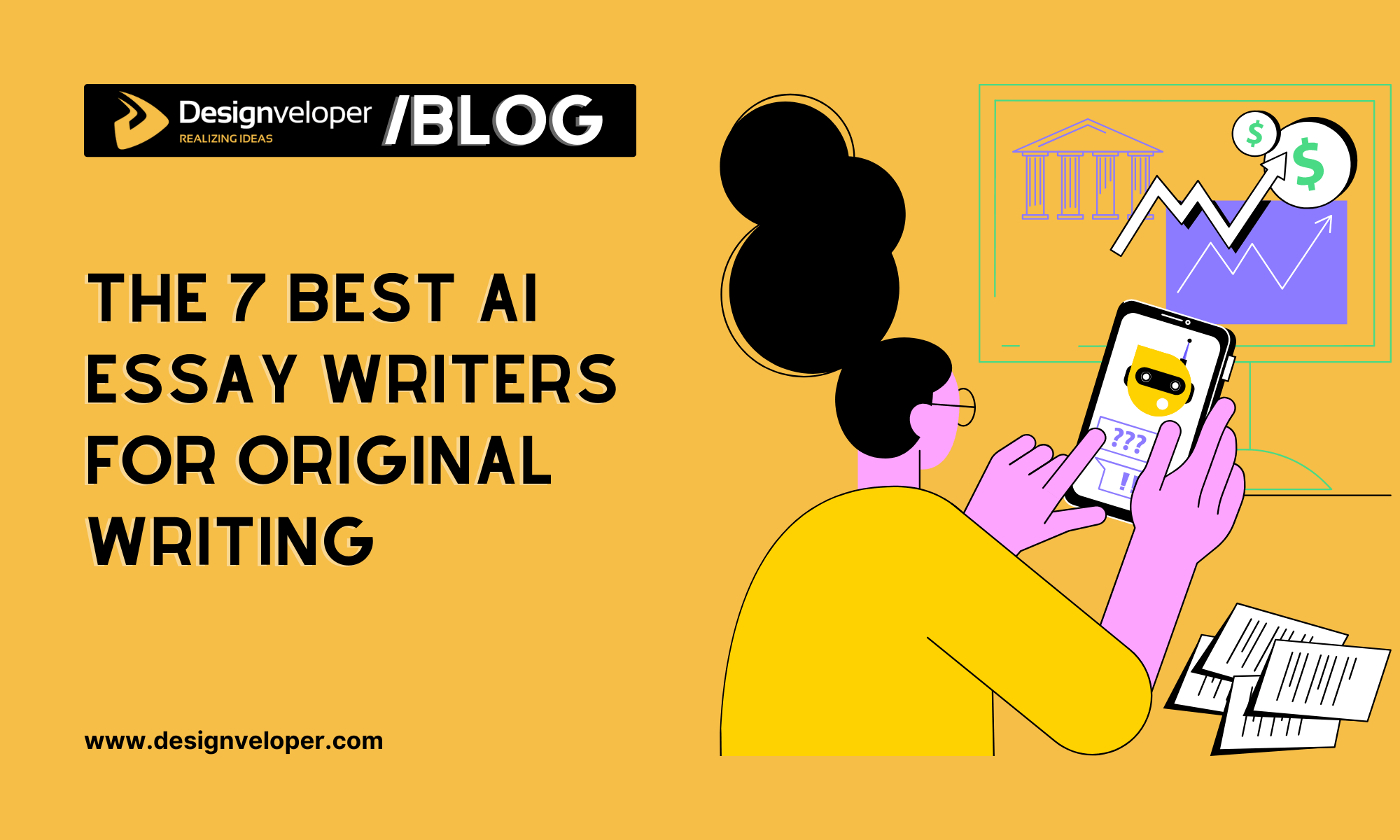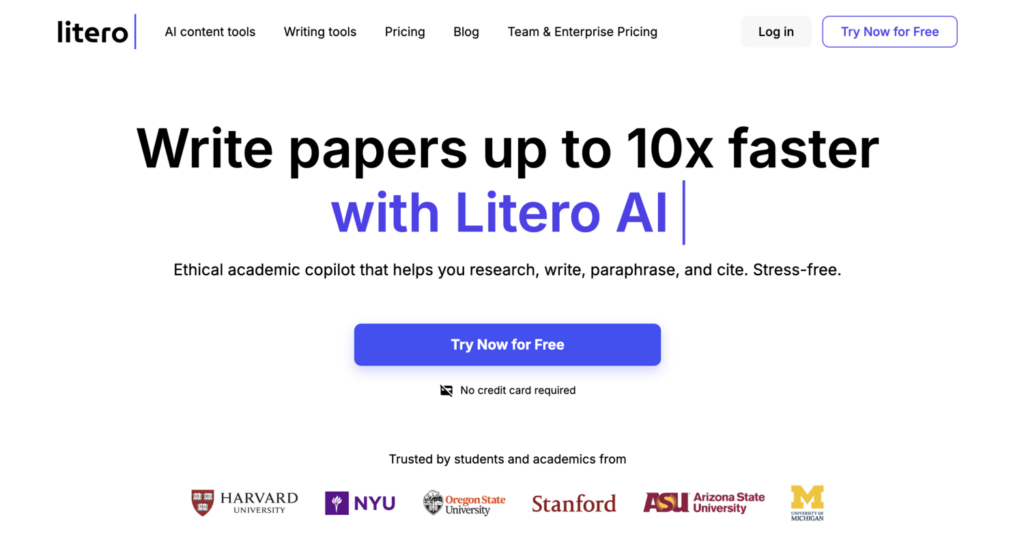The 7 Best AI Essay Writers for Original Writing

Research is hard. Writing about your research? Even harder. It’s one thing to design a study, analyze data, or explore a historical theory—quite another to present it all in a clear, structured, and persuasive academic essay. That’s where AI writing tools have begun to carve out a niche—not by replacing human expertise but by streamlining the writing process for those who value precision, depth, and originality.
In 2025, researchers face tight publication deadlines, evolving journal standards, and growing administrative workloads. AI essay writers offer support for structuring ideas, refining drafts, and maintaining citation accuracy. This guide explores seven standout AI tools for academic and research writing, with a deep dive into what makes each one useful (or not).
Top 7 AI Essay Writers for Researchers
1. Litero

Overview:
Litero is a purpose-built AI academic writing assistant made specifically for students, researchers, and educators. Unlike general AI generators, Litero essay writer integrates features essential to scholarly writing—support for citations, ethical use, and feedback tailored to critical thinking.
Why Researchers Love It:
- Draft memory that adapts to your structure over time
- Real-time academic feedback for clarity and tone with AI companion – Literka
- Built-in options to refine your draft that align with research ethics
- Generates accurate APA, MLA, and Harvard citations
- Designed to help users ideate, not generate
Best For:
Academic researchers, postgraduate students, and grant writers who need a structured, ethical writing environment with real academic outputs.
2. Paperpal
Overview:
Paperpal is an AI tool designed to support research communication. It assists in manuscript preparation, polishing language, and ensuring that academic papers meet journal-level standards.
Why Researchers Love It:
- Strong support for clarity, tone, and grammar in scientific writing
- Real-time suggestions improve sentence structure and readability
- Integrates with journal databases for compliance checks
Limitations:
Paperpal is less about ideation and more about refinement, which makes it an excellent finishing tool but less helpful for early-stage writing.
Best For:
Researchers preparing manuscripts for submission to peer-reviewed journals.
3. Thesify
Overview:
Thesify is built for thesis-level academic writing. It specializes in long-form essays, literature reviews, and structured dissertations, offering detailed support for chapter-level organization.
Why Researchers Love It:
- Organizes writing into thesis/dissertation chapters
- Suggests transitions and topic connections across sections
- Supports integration with Zotero and EndNote
Limitations:
The interface is less intuitive than some newer tools, and it may require a learning curve for full use.
Best For:
Graduate students writing dissertations or large-scale research projects.
4. Jenni AI
Overview:
Jenni is a guided writing assistant that builds your essay with you. It offers predictive suggestions, paraphrasing, and real-time support while you write.
Why Researchers Love It:
- Keeps your voice consistent while helping complete paragraphs
- Works well with academic tones and structure
- Provides suggestions without being intrusive
Limitations:
Not ideal for high-level citation generation or formal referencing.
Best For:
Researchers and students who want paragraph-by-paragraph assistance while preserving their academic tone.
5. ChatGPT (Study Mode)
Overview:
ChatGPT’s Study Mode adapts its conversational abilities to support research-based tasks. It can help with outlining, brainstorming, rephrasing, and peer-level feedback simulations.
Why Researchers Love It:
- Great for literature review planning and concept explanation
- Can act as a “writing buddy” to challenge arguments
- Excellent for restructuring content and exploring different lenses
Limitations:
It may invent sources or stray into generalization. All outputs need fact-checking.
Best For:
Researchers who want to ideate or clarify complex arguments in early drafts.
6. Wordtune
Overview:
Wordtune focuses on rewriting and enhancing text for better flow and readability. It excels at improving existing drafts and polishing sentences for maximum clarity.
Why Researchers Love It:
- Makes academic text more readable without oversimplifying
- Offers tone adjustments for formal or conversational styles
- Useful for editing research abstracts and introductions
Limitations:
Lacks citation tools and full essay-building features.
Best For:
Editing abstracts, grant applications, or rewriting dense paragraphs.
7. Authorea
Overview:
Authorea is a collaborative writing platform tailored for researchers. It supports LaTeX, citations, version control, and journal-ready formatting.
Why Researchers Love It:
- Supports collaborative academic writing in real time
- Integrates citation managers and DOI support
- Offers templates for journal-specific formatting
Limitations:
Not designed as a generative AI—best used with a writing partner like Litero or ChatGPT.
Best For:
Collaborative paper writing, especially in STEM fields with LaTeX requirements.
Key Takeaways: Why Litero Ranks Highest
While all tools bring unique strengths to the table, Litero stands out as the most complete solution for original academic writing. Here’s why:
- Purpose-Built for Academics: Unlike general writing tools, Litero is designed from the ground up for students and researchers.
- Maintains Integrity: It doesn’t “write for you”—it writes with you and supports you. That includes accurate citations, source reminders, and tone tuner (formal/narrative/persuasive).
- Structured and Adaptable: Supports complex, long-form academic documents while preserving your voice.
- Real Educational Utility: Litero acts more like a writing tutor than a ghostwriter—helping you learn while you write.
- Loved in Academia: It’s quietly gaining recognition in educational institutions due to its intentional, ethical design.
Factors to Consider When Choosing a Research-Level Essay Tool
When selecting an AI essay writer for academic or research purposes, not all tools are created equal. Academic writing requires rigor, transparency, and structure far beyond what casual or creative writing demands. Here’s what researchers should prioritize when evaluating options:
1. Academic Integrity & Citations
A critical aspect of any AI writing tool is its ability to uphold academic integrity. This means avoiding fabricated or “hallucinated” references, properly formatting citations, and ensuring source transparency. Tools should support major citation styles like APA, MLA, and Chicago, and preferably integrate with citation managers or allow manual source input. A platform that encourages proper referencing reinforces ethical academic practices.

2. Long-Form Writing Support
Research papers, theses, and literature reviews often exceed several thousand words. Many basic AI writing tools lose structure or coherence after a few paragraphs. Look for platforms that explicitly support long-form documents, including features like document sectioning, saved outlines, and the ability to maintain logic and clarity throughout extended drafts. A tool that crashes or becomes inconsistent mid-way through a paper isn’t useful for academic demands.
3. Preservation of Author Voice
Your academic voice is part of your intellectual identity. A good AI assistant should adapt to your tone and help express your ideas clearly, not overwrite them with generic or overly formal language. Especially in fields like qualitative research or humanities, where narrative tone and argument flow are essential, voice preservation is non-negotiable.
4. Research Integration
A tool that connects seamlessly with research databases or management platforms like Zotero, EndNote, Mendeley, or Google Scholar can drastically improve efficiency. Whether importing citations, organizing articles, or managing references, integration reduces manual work and minimizes the risk of citation errors.

5. Language Precision
Researchers must communicate ideas with precision and clarity. Look for tools that go beyond grammar checks to offer sentence restructuring, formal tone suggestions, and vocabulary enhancements that align with academic standards. Clarity isn’t just about good writing—it’s essential for peer review and publication success.
6. Collaboration Features
If you co-author papers or work in research groups, collaborative features like real-time editing, commenting, and version history are essential. Some tools allow for seamless team workflows, ensuring that drafts are updated and accessible to all contributors.
7. Privacy and Data Control
Finally, data privacy matters. Academic work often includes unpublished research or sensitive content. Choose a platform with transparent privacy policies, secure data storage, and user control over content. Avoid platforms that repurpose your writing for training or marketing without explicit consent.
Frequently Asked Questions
Is using an AI essay writer ethical in research?
Yes—when used appropriately, AI tools can serve as legitimate aids in the research writing process. They are designed to assist with structuring ideas, organizing outlines, refining drafts, and improving clarity. When you use an AI tool as a drafting companion or brainstorming assistant, you’re still responsible for the core intellectual contributions, such as generating hypotheses, analyzing data, and drawing conclusions. Institutions emphasize academic honesty, so it’s crucial to understand where AI assistance fits in your workflow and to always disclose any AI involvement when required by policy. Ethical use means you remain the primary author and thinker behind the work, while AI supports your process—not replaces it.
Which tool is best for citation support?
For researchers, accurate citation is a non-negotiable. Tools that offer built-in citation management, support for APA, MLA, Chicago, and journal-specific styles are ideal. Some tools allow manual source input and build accurate bibliographies based on real references, while others attempt to generate citations from scratch—which can lead to fabricated or incomplete references. It’s advisable to choose platforms that either integrate with databases like Crossref, JSTOR, or PubMed, or offer citation plug-ins compatible with tools like Zotero and EndNote. Always verify generated citations manually before including them in formal submissions.
Can AI write an entire research paper for me?
Technically, some AI platforms are capable of producing long-form academic-style content. However, this raises serious questions about authorship, originality, and academic standards. While AI can help articulate complex ideas and even mimic certain tones of voice, it cannot replace the intellectual rigor required to frame research questions, develop arguments, or interpret data. A responsible approach is to use AI to draft segments like literature reviews or introductions, while ensuring the final analysis, synthesis, and conclusions are entirely your own. Remember, publishing AI-generated research content without oversight or editing can damage credibility.
Is LaTeX support necessary for AI tools?
LaTeX remains a preferred typesetting system in fields like mathematics, physics, engineering, and computer science due to its ability to format complex equations and references precisely. If you’re working in a discipline that requires journal submissions in LaTeX format—or you’re preparing a technical manuscript—choosing an AI writing assistant that supports or exports to LaTeX can save time. However, if your writing is primarily in the humanities or social sciences, LaTeX support may not be necessary, and standard word processors will suffice. Some platforms now offer seamless LaTeX integration or exports for easier formatting in academic publishing.
Do I still need Grammarly if I use another AI writing tool?
That depends on your workflow and needs. Grammarly is primarily a grammar checker and style enhancer. It helps polish sentence structure, corrects typos, and improves readability—especially for non-native speakers or researchers aiming for publication-ready writing. If your main AI tool focuses on idea generation, structure, or citations, pairing it with Grammarly can add an extra layer of linguistic refinement. The two types of tools serve different purposes: one aids content creation, the other focuses on finishing touches. For high-stakes academic writing, using both might be the ideal combination.
Final Thoughts
Academic writing will always require intellectual effort, clear argumentation, and rigorous source engagement. But AI can help reduce the friction in getting there. Whether you’re working on a thesis, journal article, literature review, or a large-scale research project, the right writing assistant can save hours—and maybe even prevent burnout along the way.
Today’s best AI writing tools don’t just generate text; they collaborate. They help you structure your ideas, refine your language, avoid accidental plagiarism, and manage citations in a fraction of the time. This is especially valuable in research, where clarity, credibility, and precision are non-negotiable.
Among all the tools we’ve reviewed, Litero remains the most comprehensive and academically aligned solution. It’s not just about speed—it’s about writing with intention and integrity. Litero supports deep work. For researchers juggling teaching, publishing, and data analysis, that kind of intelligent support makes a measurable difference.
In a research landscape that is only becoming more demanding, the right AI companion doesn’t replace scholarship—it amplifies it. And with platforms like Litero continuing to evolve in tandem with academic needs, researchers now have access to tools that respect both the craft and the responsibility of scholarly writing.
Bottom line: the future of academic writing won’t be automated—but it will be augmented. And choosing the right AI tool today might be what keeps your next deadline from turning into another sleepless night.

















































